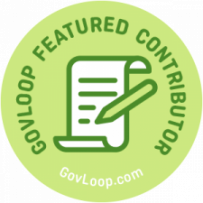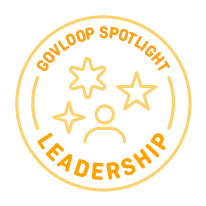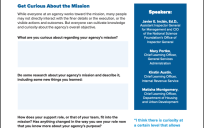 How many times have you taken yet another class, another detail, another position and wondered whether it would add up to the goal you want to reach in your career?
How many times have you taken yet another class, another detail, another position and wondered whether it would add up to the goal you want to reach in your career?
There is a tool that will help you see the interconnectedness of your experiences as you move toward professional mastery in your career.
An ecosystem in the context of your career development can provide a framework with which you can connect your varied skills, knowledge and experiences in a seamless way. An ecosystem as defined by Dictionary.com is “a complex network or interconnected system.” How can you create a system or network of knowledge that leads to professional mastery?
As career professionals committed to ongoing development, we understand the need to continuously “sharpen the saw,” as Steven Covey advises in his timeless book, “The 7 Habits of Highly Effective People.” We must continue to sharpen the skills necessary to ensure our ultimate career success. However, the approach most career professionals take looks more like selecting one course/experience from column A and one course/experience from column B, and hoping there will be synergy at the end. Instead, in the end, you’re wondering if you wasted your time and energy because you didn’t see a connection occurring in the process.
Here’s the beauty of employing a knowledge ecosystem as a means of connecting your investment of time and energy in what may appear to be disparate activities. By creating a framework that connects your experiences and shows that you’re moving toward professional mastery, you’re free to engage in deep and varied learning. You are more inclined to take advantage of many opportunities knowing that they will bring you closer to true mastery. Nothing wasted, more to gain. Let me demonstrate this concept by way of a historical perspective and then a personal story.
A historical perspective
In Robert Greene’s book “Mastery,” he tells the story of Leonardo de Vinci. Leonardo spent his time as a child wandering into the woods with paper and pen to sketch what he saw. He would spend hours on one flower to capture every line in a petal. As he matured, in both his age and art, he grew to be disciplined and focused in each of his inventions. “He would pursue all of the crafts and sciences that interested him – architecture, military engineering, hydraulics, anatomy, sculpture. For any prince or patron that wanted him, he could serve as an overall advisor and artist, for a nice stipend. His mind, he decided, worked best when he had several different projects at hand, allowing him to build all kinds of connections between them,” Greene wrote.
Some, including his parents, thought spending hours focused on the lines of a single petal was a waste of his time. Yet his investment at a young age in creating a strong focus, an appreciation of beauty and the interconnectedness of many different interests ultimately led to his invitation as an advisor to Francois I and a life of financial security and acclaim. Nothing wasted, more to gain.
My story
In my own career, I’ve had the opportunity to be a manager, a systems engineer, an entrepreneur, several global HR roles and now a program analyst at the IRS. When I reflect on these seemingly disparate roles, there was always one element, which I discovered at the age of 6, that gave me joy.
During summers as a child, I would take lessons from my Catholic school education and teach my friends how to write in the cursive style. I took great joy in preparing the lessons, the sheets of lined paper, and would help them write their names in cursive. I loved it! Teaching gave me joy. And in every one of the roles I’ve had in my career, I recognized that I always found a way to help people learn something new. Nothing wasted, more to gain.
While I don’t claim to be in Leonardo’s class, our knowledge ecosystem is the same. Using every opportunity to acquire knowledge guided us both to find the interconnectedness, or ecosystem, of our interests and experiences and spurred us on to greater professional mastery.
Where are you leveraging each lesson, class, training, experience, etc., to connect the dots toward your ultimate career success? How can you design your knowledge ecosystem so that it moves you toward a professional mastery?
Here’s where you can start to create your knowledge ecosystem.
First, what is it that you always wanted to do as a child, before the world told you what you wanted to do? Take some time with paper and pen, like Leonardo, and write it down in detail. You may be surprised by what you learn about yourself and how you’ve approached many of your career goals.
Next, look at each opportunity you’ve had up to the moment of reading this. What did you do as a teen, young adult or adult that allowed you – even on a small level – to do what you’ve always wanted to do? I bet there are some similarities there.
Finally, think about your next moves. Where can you continue, in your present position or in a future position to fully support what you’ve always wanted to do in the world? As Greene points out, “This is a power and intelligence that must be continually renewed or it will die.”
By creating and embracing your knowledge ecosystem, you gain greater control over your career choices and immense power in developing your personal mastery.
Interested in becoming a Featured Contributor? Email topics you’re interested in covering for GovLoop to [email protected]. And to read more from our Spring 2021 Cohort, here is a full list of every Featured Contributor during this cohort.
Christine “Chris” Makell has worked for the Internal Revenue Service (IRS) for over four years, having held positions of increasing challenges and responsibility in that short time. She is currently a Program Analyst in the Knowledge Management & Transfer office. She joins federal service after a 28-year career in the private sector and six years as the owner of Chris Makell Consulting/Coaching working with individuals and sales teams to achieve greater success.






Love the stories you shared, and the practical questions! I had never thought about approaching my career as an ecosystem
Thank you Pearl for the great feedback! As you can see I really do love to teach, especially when sharing stories and new ways to approach using your inner brilliance and experiences to create success.